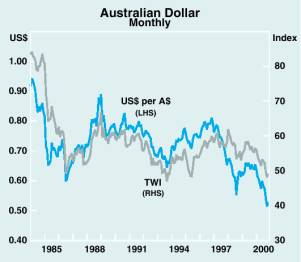
|
Background |
A lot has been
written, more has been said during the past year about what's wrong
with Australia's economy, but perhaps more to the point is the question of our
nation's well being and the quality of the lives of its people –
all of them.
A lot less has been discussed in the popular media about how to improve it.
Two sizeable reports, commissioned by the Federal Government in 1999, were
submitted to it in August and November 2000 (see links toward the bottom of this
page). They set out critically a series of
initiatives that in the main should –
must – be taken if Australia is to catch up with the world's leading
nations in regard to science, technology and innovation.
How far the Howard ministry will go to support those recommendations
remains to be seen. Just what the Opposition will propose also
remains a mystery. And finally, what role the media are prepared to play
is a serious question. How much
time or space has the popular media given to the issues discussed and
recommendations made in these reports? (A Time editor once remarked that there are two kinds of news,
"interesting" and "important". Only occasionally do they coincide),
but the job of a journalist is to make what's important interesting.
The graph below summarises one result of the problem of not keeping pace with our cohort nations in science, technology and advanced education. It was 1986 that a future Prime Minister then sitting as Treasure referred to Australia as a "banana republic." Look at the graph and compare 1986 with 2000. It's also interesting that the cycle of rise and fall took first 7 years ('86 - '94) then 4.5 years ('94 - '98) and now 2.5 years ('98 - '00). And each time the upturn when it came peaked below that of the previous cycle. Conclusion: our currency is being progressively devalued relative to our trading partners.
Value
of the Australian dollar versus the US$__
and the
Trade Weighted Index (TWI) __
since
it was floated.
(Taken from the Reserve Bank's Nov. 2000 Report)
Notice particularly the drop in the past four years between the end of 1996 and the end of 2000.
Q:
What's the TWI?
A: The value of the Australian $ against a weighted average of the
currencies of the 20 nations with whom we trade most. TWI
63k![]()
To get an idea of what The Funneled Web is on about take a few minutes to browse through the executive summaries referred to below. The detailed reports are also available for you to download. In all cases they've been carefully written and formatted to allow them to be readily understood. During the coming months TWF intends to publish pertinent articles and editorials and list important links with a view to making constructive contributions to the debate. Who knows a worthwhile and original idea may even creep in from time to time.
Innovation: Unlocking the Future: exec. sum , full report 275k
summarises the findings and recommendations of the Innovation Summit [Web site].
The Chance to Change is the Chief Scientist's submission. It emphasises the importance of science, engineering and technology and their role in shaping Australia's future: full report 1143k
. And access the Web site for additional details.
As yet there has been no comparable commissioned Australian study regarding education at all levels, however...
Before It's Too Late: A Report to the Nation from The National Commission on Mathematics and Science Teaching for the 21st Century was presented to U.S. Secretary of Education shortly after the Australian Government received the reports from the Innovation Summit and the Chief Scientist. The conclusions of the committee headed by a former Astronaut and senator from Ohio, John Glenn, paint a grim picture. How much notice the newly installed US Government will take remains to be seen. But Before It's Too Late ought to be required reading for our legislators, educators and parents who care about our country. The next reference, although not commissioned by the Australian Government, presents comparable concerns. Before it's too late, exec. sum. The full 50 page report 1900k
. [Web site]
Mathematical Sciences in Australia: Looking For a Future was published almost coincidentally with the release of the Glenn Report by the Federation of Australian Scientific and Technological Societies (FASTS). Exec. sum. Full report 108k
. [Web Site]
Finally, perhaps the anecdote
with which Stephan Hawking opens A Brief History of Time illustrates the point regarding knowledge vs. complacency.
Canberra, we have a problem